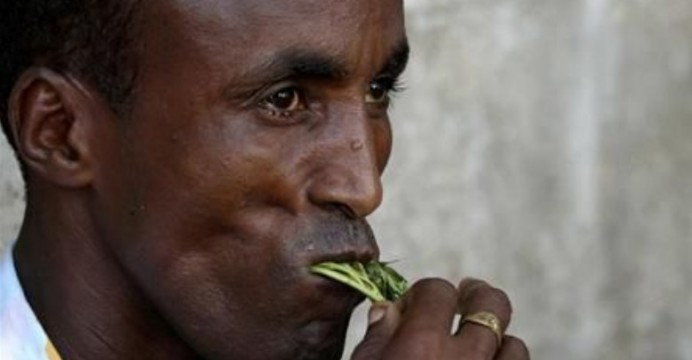East Africa is markedly different now from ten years ago if we look at how widespread “grass-munching” has become.
“Grass-munching” refers to the consumption of khat or Catha edulis, or the derogatory term “East African Poppy”. The plant comes from Ethiopia and Kenya. It is a soft drug with a short-term stimulant effect, but long-term consumption will have various side effects. Many countries have banned its importation.
The consumption of khat in East African countries has a long history. For one, it is a local plant and suits the economic climate of this region. Locals tend to consume khat raw, munching it for hours to experience the stimulant effect. In these impoverished countries, khat-eating can be a source of great entertainment, especially if done in groups.
The elite classes in East Africa, who can afford more expensive drugs, despise the practice because the sight of khat-consuming people can be quite unseemly. The president of Somalia has spoken against it.
Many working-class people – drivers, bodyguards, and even the policemen – consume khat as they carry on working. Their productivity is thus adversely affected. As the drug takes effect, they may start talking loudly or become short-tempered.
Over the past decade, the popularization of khat is a by-product of the civil war in Somalia. As refugees spread across East Africa, they bring with them khat. Since the effect of the plant only stays for 48 hours, globalization of the drug is costly. However, because of the strong demand, the plant travels overseas by air freight.
Khat in Somalia also benefits from the “pirate enterprise”: pirates share their gains with their clansmen, who spend some of the money on the drug.
Compared to Somalia, which has a per capita GDP of around US$100 to US$200, Somaliland is better off, although not by a big margin.
Many poor people in these countries allocate a fixed portion of their income to buy khat. Sometimes, they work hard enough just to be able to buy more khat.
Not recognized as a country, Somaliland suffers from hyperinflation because of the increase in its money supply. Like in Zimbabwe in the old days, khat has become like a currency, offering a more stable exchange value than a banknote.
For many who live in East Africa, it is difficult to refrain from consuming khat. For outsiders, it is hard to imagine how this khat-munching habit will ever end.
This article appeared in the Hong Kong Economic Journal on March 20
Translation by Jennifer Wong
![]()





























